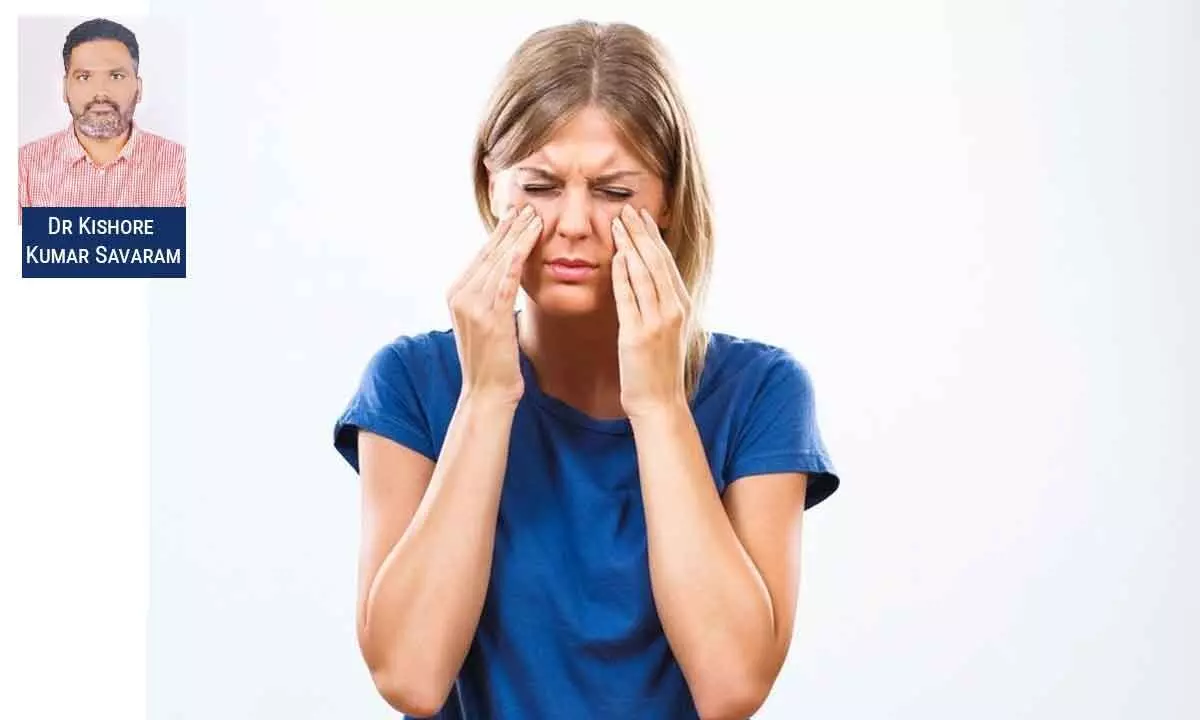Live
- Three persons admitted to hospital for diarrhea treatment
- First Star Outside Milky Way Captured: WOH G64 is 2,000 Times Larger Than the Sun
- Sikkim govt to constitute state Niti Ayog: CM Tamang
- CBI books Rajasthan narcotics inspector for Rs 3 lakh bribe
- Rajasthan bypolls: A tough contest between BJP and Congress
- Albania joins SEPA, paving way for EU integration
- Japanese government approves 250-billion USD economic package to ease price pain
- Six pharma companies to set up their units in Telangana
- The Unstable Events of a 17-Wicket Day in Perth: India vs Australia
- Dutch FM's Israel trip cancelled after Netanyahu's arrest warrant
Just In

Dr Kishore Kumar Savaram from Sahasra Ent Clinic, Pragathi Nagar Kukatpally, Hyderabad, talks about the causes, symptoms and treatment
Sinusitis is a condition characterised by inflammation or infection of the sinuses, which are air-filled cavities located within the face and skull bones. The sinuses are lined with a thin layer of mucus-producing cells that help to moisten the air we breathe and filter out impurities. When the sinuses become inflamed or infected, they can cause various symptoms.
The most common cause of sinusitis is a viral infection, such as the common cold, which can lead to the inflammation of the sinus lining. Other factors contributing to sinusitis include bacterial infections, fungal infections, allergies, nasal polyps, a deviated septum, or structural abnormalities in the sinuses.
The symptoms of sinusitis can vary but often include:
1. Facial pain or pressure: This is usually felt around the eyes, cheeks, forehead, or the bridge of the nose.
2. Nasal congestion: The nasal passages may feel blocked or congested, making it difficult to breathe through the nose.
3. Thick, discoloured nasal discharge: The mucus may be yellow or green in colour.
4. Reduced sense of smell and taste.
5. Coughing: This is more common when the mucus drips down the back of the throat.
6. Headache: Often felt in the forehead area.
7. Fatigue: Sinusitis can cause a general feeling of tiredness or exhaustion.
8. Sore throat: Postnasal drip may cause a sore throat or a persistent cough.
Treatment for sinusitis depends on the underlying cause and severity of symptoms. In many cases, sinusitis caused by a viral infection will resolve within a week or two, and home remedies such as saline nasal irrigation, steam inhalation, and adequate hydration can help relieve symptoms. Over-the-counter pain relievers and decongestants may also be used to manage discomfort and congestion.
If the sinusitis is bacterial, a healthcare provider may prescribe antibiotics to clear the infection. Further investigation and treatment may be necessary for chronic or recurring sinusitis, such as imaging studies, allergy testing, or referral to an ear, nose, and throat specialist.
It’s important to consult with a healthcare professional for an accurate diagnosis and appropriate treatment plan tailored to your specific condition.
The treatment of sinusitis depends on the underlying cause, severity of symptoms, and duration of the condition.
Here are some common approaches to treating sinusitis:
1. Self-care measures:
Nasal irrigation: Use a saline solution or a neti pot to rinse the nasal passages and relieve congestion.
Warm compresses: Apply warm compresses to the face to alleviate pain and promote sinus drainage.
Stay hydrated: Drink plenty of fluids to help thin the mucus and promote drainage.
Rest: Get enough rest to support healing and boost your immune system.
2. Medications:
Decongestants: Over-the-counter nasal sprays or oral decongestants can help reduce nasal congestion. However, prolonged use of nasal sprays can lead to rebound congestion, so they should be used for a short duration.
Pain relievers: Nonsteroidal anti-inflammatory drugs (NSAIDs) like ibuprofen or acetaminophen can help relieve pain and reduce inflammation.
Nasal corticosteroids: Prescription nasal sprays can help reduce inflammation in the nasal passages and relieve symptoms.
Antibiotics: If a bacterial infection causes sinusitis or if symptoms persist for more than 10 days, your doctor may prescribe antibiotics.
3. Allergy management:
If allergies trigger sinusitis, your doctor may recommend allergy testing and treatment with antihistamines, nasal corticosteroids, or immunotherapy (allergy shots) to manage the underlying allergies.
4. Sinus drainage:
If other treatments are not effective or if sinusitis is severe and recurrent, your doctor may recommend procedures to drain the sinuses, such as endoscopic sinus surgery (FESS) or endoscopic septal correction along with sinus drainage with FESS based on findings of endoscopy
Consulting a healthcare professional for an accurate diagnosis and appropriate treatment plan is important. They can evaluate your specific condition and recommend the most suitable treatment options CTpns.
(Ph: 8328686012, email: [email protected])

© 2024 Hyderabad Media House Limited/The Hans India. All rights reserved. Powered by hocalwire.com







